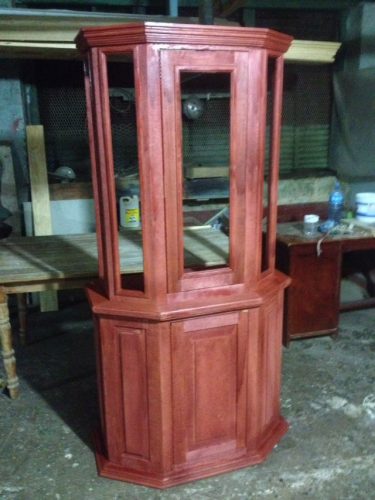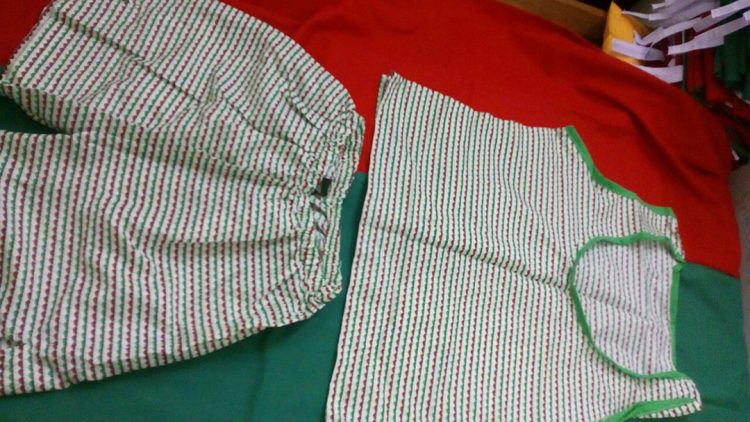The Guyana Prison Service (GPS) is working to expand its self-enhancement programmes to give convicts a second chance to make something of themselves during their incarceration and to prepare them for life after prison, according to Prisons Director (ag) Gladwin Samuels.
In addition to ongoing skills training programmes for both male and female prisoners, efforts are being made to give prisoners equal access to the Caribbean Secondary Entrance Certificate (CSEC) examinations. The GPS is also focusing on anger management and other types of behavioural modification.
Prisoners at the facilities at New Amsterdam, Mazaruni, Lusignan and Timehri are all exposed to some sort of academic or vocational skills training (currently nothing is being offered at the Georgetown Prison, following a devastating fire in July) and Samuels said that for this year hundreds have benefitted.
Apart from 85 who were undergoing behavioural modification programmes, there 1,209 who benefitted from an I-Learn programme, 180 from vocational skills training, 96 from numeracy and/or literacy programmes, 17 from arts and crafts training and 269 from outdoor work, according to statistics Samuels made available.
He noted that skills training is offered only to those prisoners who are sentenced to lengthy prison terms. He explained that upon conviction, the prisoners are interviewed by the Sentencing Management Unit at their respective prison and it would work out a plan of action for the duration of the sentence.
“If you put someone with a six months on one of those programmes, it don’t really work out,” he said, while explaining that the programmes run for a specific period and it makes no sense to enroll an inmate whose sentence will end before the programme concludes. He added that those prisoners are placed in short programmes, depending on the offence they are incarcerated for.
“The reality of it is because we have a serious issue with space, we are unable to target as much persons as we would like, but what we are doing, we are now trying to partner with external agencies… we are trying to bring New Amsterdam Technical Institute (NATI) on board to have them come into the prison to do skills training… bringing their training programmes into the prison,” he said.
Noting that this initiative could become a reality by September next year, he said that because it will be a programme specifically tailored for prisoners, they might be able to start it outside of the normal semester. He added that an assessment is being done based on the institute’s entry requirements. He noted that in undertaking the initiative several things have to be taken into consideration, including the fact that selected prisoners must be serving a sentence that is at least four years long, which would be the duration of the programme.
Exposure
Among the skills training programmes being offered is joinery. This, Samuels said, is conducted by an external specialist at the Timehri and Lusignan prisons and the training is done by an external specialist. He noted that because of a lack of space, a lot of the exposure to skills is done on the outside. “We do not have adequate space for persons to practice, so once they learn the basics on the outside we then assign them to the work parties, where they are able to develop on their skills and that is why you have prisoners …working in outdoor parties,” he explained.
Male prisoners are also exposed to farming, livestock rearing, and landscaping, while female prisoners are being trained in cosmetology and embroidery.
Male prisoners at Mazaruni, Lusignan and New Amsterdam prisons are engaged in crop and livestock farming. Chickens and ducks are reared at the New Amsterdam prison, while ducks, chickens, sheep and pigs are reared at the Lusignan prison. Cows, sheep, pigs are reared at the Mazaruni prison, where chickens will soon be reared.
At the moment, inmates at the Timehri prison are engaged in vegetable farming. It was explained that given the prison’s close proximity to the Cheddi Jagan International Airport, the livestock rearing had to be discontinued.
With regards to the Georgetown Prison, Samuels said the prison fire which destroyed the welding and carpentry shops there has significantly affected those training programmes. He stated though that additional training tools will be bought to help expand the skills training programmes.
According to Samuels, members of the prison staff are also sent to the E.R Burrowes School of Arts as well as Carnegie School of Home Economics to learn art and culinary skills, respectively, and once they complete their programmes they would return to the prison and offer training to inmates.
Samuels also observed that given everything that has been happening in the prison system, acquiring trainers has become “more complicated.” He said that a detailed assessment of these persons has to be conducted before they are allowed into the prison system.
Samuels noted that the Mazaruni prison is the only facility that presently offers CSEC classes but he assured that plans are afoot to have this expanded to the other prisons. The subjects being offered are Mathematics, Principles of Business and English.
He explained that with the change in the command of the prison welfare and corrections unit, the entire training model is being reconfigured, hence the delay in offering CSEC at the other prisons.
Samuels admitted that at times there is resistance from prisoners to joining the literacy programme, in particular, since there is some embarrassment about attending such classes. He said that the Sentence Management Unit would engage these prisoners about the importance of such classes. He said that a system has been put in place so that “unless you do what is considered as mandatory training, then you can’t go outside and [do] labour. When you go outside and [do] labour, that is where you actually earn. So, you must do A in order to benefit from B.”
Members of the public can have the skilled prisoners do work for them but there is a process that has to be followed. Anyone interested can made contact with the prison headquarters and indicate what they want done. A prison official would then be sent to do an assessment of the work to be done and based on what is required, prisoners would be assigned to undertake the work, for which they would be paid. Samuels told Stabroek News that with the money that convicts earn, many are able to provide for themselves in the prison as well as to send monies to their families.
Samuels also informed that rehabilitation services, such as anger management, are also being offered to prisoners. He said that the aim of these forms of rehabilitation is to bring about a change in the behaviour that may have led to the inmate being incarcerated in the first place, such as in cases of spousal abuse. “We try to improve them… we try to expose them to some aspect of domestic violence training and so on because we do partner with the Ministry of Social Protection and other agencies to offer training,” he noted.







